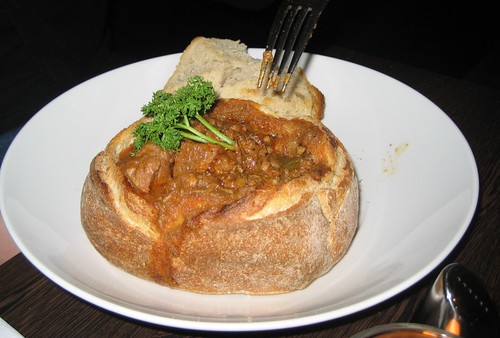Food and the Concept of Authenticity
I wrote this as part of a Chowhound discussion of authentic food. Previous contributors had shredded the concept of authenticity into meaninglessness... e.g. is Burger King authentic American cuisine since many Americans like to eat there, etc. So I wrote this:
All concepts fray around the edges, and, as Derrida and his followers proved, if you pick at these edges the whole concept will unravel. Wittgenstein said that some words embrace whole families of things united only by vague resemblances and ties of consanguinity. And so it is with authenticity. Let's try to pick an example close to the core.
In an article in the New Yorker called "Carnal Knowledge: How I became a Tuscan Butcher" (later a part of his book), Bill Buford describes a months-long sojourn with a butcher in Tuscany who taught him his craft. Handed down over the centuries, the seemingly simple procedures for cutting up a pig were devilishly hard to learn and many a time Buford did a pratfall into a vat of pig slime to the great amusement of all (except him). But slowly he learned them, the same way you learn to swim or drive a car. I think the sausages the butcher made were authentic. They are made 1) by complex procedures 2) which evolved over a long period of time 3) and are best learned by apprenticeship 4) and the learning increases the appreciation of the food 5) in part because of an attitude of reverence which is imparted along with the tradition.
At least for me, a lot of these factors come into play when I ask if food is authentic. Maybe authenticity is the wrong word. No one asks if Michelangelo's painting is authentic (unless they suspect it is a forgery). Even for great communal and traditional art forms like the temple architecture and dances of Bali, authenticity takes second place to greatness. Since food is art, maybe a new linguistic category is needed. One day, perhaps, Tuscan butchers will be an extinct breed, and everyone in Tuscany will want to buy supermarket patties made in the US, and top it with sauce from a can. In time that will become the authentic Tuscan meal. But it will not be great, nor will it be art, nor will it be tied to a long tradition, or any tradition at all, and reverence will not be a part of it.
 Czech, please!
Czech, please!
 Photo by flickr user 'puzzlement'.
Some rights reserved.
Photo by flickr user 'puzzlement'.
Some rights reserved.













No comments:
Post a Comment